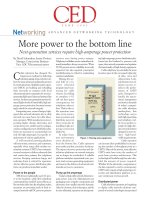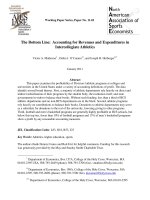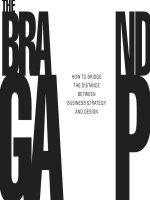The business school and the bottom line
Bạn đang xem bản rút gọn của tài liệu. Xem và tải ngay bản đầy đủ của tài liệu tại đây (696.21 KB, 253 trang )
This page intentionally left blank
The Business School and the Bottom Line
In recent decades business schools have become important
components of higher education throughout the world. Surprisingly,
however, they have been the subject of little serious study from a
critical perspective. This book provides a sober and evidence-based
corrective, charting the history and character of business schools in
the light of current debates about the role of universities and the
evolution of advanced economies. Previous commentators have
viewed business schools as falling between two stools: lacking in
academic rigour yet simultaneously derided by the corporate world
as broadly irrelevant. Over-concern with criticism risks ignoring the
benefits of reform, however. What business schools need is
reconfiguration based on new relationships with academia and
business. Such change would deliver institutions that are truly fit
for purpose, allowing them to become key players in the twentyfirst century’s emergent knowledge societies. This timely critique
should be read by academics and policy-makers concerned with the
present state and future development of business education.
k e n s t a r k ey is Professor of Management and Organisational
Learning and head of the Strategy Division at Nottingham
University Business School. He is a former chair of the British
Academy of Management Research Committee and a fellow of the
Sunningdale Institute of the National School of Government. He is
the author of ten books, including How Organisations Learn (2004).
n i c k t i r at s o o is currently chair of a regeneration charity in East
London. He was previously Visiting Research Fellow with the
Business History Unit at the London School of Economics and
Political Science, and Senior Research Fellow at Nottingham
University Business School. He has published widely in the fields of
political history, business history and planning history.
‘Business schools play a key role in higher education and in the economic institutions that drive modern societies. Yet little systematic
scholarship has been devoted to understanding and improving them.
Starkey and Tiratsoo fill this gap admirably. They trace business
schools’ evolution globally; identify the diverse demands facing them
today; describe their approaches to teaching and research; and provide
reasonable prescriptions for their future success. This book is essential
reading for all of us – administrators, faculty, students and corporate
leaders alike – who want (and need) business schools to thrive.’
Thomas G. Cummings, Professor and Chair, Department of
Management and Organization, Marshall School of Business,
University of Southern California
‘This is an important book. How academic institutions are managed so
as to create strong, positive societal values is key – and this is what the
book is all about. A must-read!’
Peter Lorange, President IMD and the Nestlé Professor
‘This book provides critical and valuable insights into the understanding of the challenges business schools are facing in the current world as
a result of globalisation trends. This thoughtful and constructive analysis will contribute to improve their leadership and governance – a top
priority in making a positive impact not only in management education
worldwide but also in society as a whole.’
Fernando Fragueiro, Dean, IAE Business School, Austral University,
Argentina
‘Increasingly influential – and increasingly criticised – there is no better
gathering of facts about what’s going in business schools than this work
from two experienced authors who have read, probed and interviewed
widely. Especially fine are their analyses of the changing relationship
between town and gown; chapter 6 is a jewel. Their no-holds-barred
remarks about the weaknesses of today’s business school strategies, and
the possibilities for tomorrow’s, are simply the best available in this
globalising discussion.’
J.C. Spender, Svenska Handelsbanke, Fulbright-Queen's Research
Professor, Queen’s University, Canada, and Lund University School
of Economics and Management, Sweden
The Business School
and the Bottom Line
k e n s t a r k ey a n d n i c k t i r at s o o
CAMBRIDGE UNIVERSITY PRESS
Cambridge, New York, Melbourne, Madrid, Cape Town, Singapore, São Paulo
Cambridge University Press
The Edinburgh Building, Cambridge CB2 8RU, UK
Published in the United States of America by Cambridge University Press, New York
www.cambridge.org
Information on this title: www.cambridge.org/9780521865111
© Ken Starkey and Nick Tiratsoo 2007
This publication is in copyright. Subject to statutory exception and to the provision of
relevant collective licensing agreements, no reproduction of any part may take place
without the written permission of Cambridge University Press.
First published in print format 2007
eBook (EBL)
ISBN-13 978-0-511-35478-6
ISBN-10 0-511-35478-9
eBook (EBL)
hardback
ISBN-13 978-0-521-86511-1
hardback
ISBN-10 0-521-86511-5
Cambridge University Press has no responsibility for the persistence or accuracy of urls
for external or third-party internet websites referred to in this publication, and does not
guarantee that any content on such websites is, or will remain, accurate or appropriate.
Contents
List of tables
Acknowledgements
Prologue
page vi
vii
ix
1
Introduction
1
2
The development and diffusion of the business school
15
3
Business schools in the era of hyper-competition:
‘more “business” and less “school” ’
50
4
Business school education
77
5
Business school research
115
6
Experiments and innovations
140
7
Imaginary MBAs
169
8
Business school futures: mission impossible?
195
Epilogue
Index
228
230
Tables
2.1
US-earned degrees in business by degree-granting
institutions, selected years 1955/6 to 2002/3
2.2
MBA programmes and institutions delivering MBA
programmes, selected countries, January 2006
2.3
30
Estimated total cost of full-time MBA programmes,
dollars, 2002–4
5.1
24
Federation of British Industries: varying definitions
of key concepts, 1963
3.1
page 17
56
Business experience of tenured professors at selected
top business schools, 2004
131
Acknowledgements
This book is based upon work funded by the Economic and Social
Research Council (ESRC) as part of its Evolution of Business
Knowledge (EBK) programme (Grant RES-334-25-0009). We are very
grateful to the ESRC for its support, and also wish to thank Harry
Scarbrough, the director of EBK, for his guidance and advice, and the
other members of our team – Catrina Alferoff, Graeme Currie,
David Knights, Andy Lockett, Laura Pearson, Alison Seymour,
Sue Tempest and Mike Wright – for many stimulating conversations, and inputs of energy and ideas, without which our understanding of the business school world would have been very much
the poorer.
During the course of our research we interviewed a large number
of people, who agreed to talk to us on condition that they remain
anonymous, and we would like to take this chance to thank every one
of them again, especially because, without exception – almost! – they
answered our insistent badgering thoughtfully and with good humour.
Many other people have assisted us, and we acknowledge, in
particular, Lars Engwall, Guiliana Gemelli, Gerry Johnson, Andrew
Pettigrew, David Tranfield, John Wilson and Vera Zamagni (who
helped launch the various debates that provoked our initial interest
in business schools); Armand Hatchuel and Rolv Petter Amdam (who
provided important entry points into the world of non-Anglo-Saxon
management); Sandra Baum, Mark Clapson, Terry Gourvish, Clive
Holtham, Keri Minehart, Robert S. Sullivan, Sylvia Tiratsoo, Jim
Tomlinson, Nigel Waite, Paula Parish and team at Cambridge
University Press; and participants at a 2005 seminar at the Business
History Unit, the London School of Economics and Political Science,
especially Forest Capie and Roy Edwards.
viii acknowledgements
Of course, while we have benefited greatly from the help of
everyone mentioned, we alone accept responsibility for the argument
that follows.
Prologue
a cautionary tale
In May 2006 a large group of Nukak-Makú leave the Amazon jungle
and arrive at San José del Guaviare in Colombia, ready to join the
modern world.1
They are leaving the nomadic life of the hunter-gatherer, where
the staples of life are killing monkeys for meat and collecting berries
and nuts. Ill-adapted physically and mentally to the demands of the
new life that they are seeking, and susceptible to illnesses they have
not encountered before, they have no sense of how the new world in
which they find themselves works. Crucially, they have no concept
of money or of property. They think that the planes that they see in
the sky overhead are moving on an invisible road.
It is not clear why the Nukak have acted. Perhaps the relentless
struggle for existence has worn them down. It is also possible that
they have been driven out by the Green Nukak, bands of Marxist
guerrilla fighters, or been displaced by farmers growing coca to make
cocaine. The Nukak are a peace-loving people and not prone to fight
to defend their territory. Previous Nukak arrivals from the jungle
have received state aid and housing and have come to enjoy the benefits of pots, pants, shoes, caps, rice, flour, sugar, oil, eggs, onions,
matches, soap, housing and medical attention. This new group aims
to follow suit. Having quickly learnt the value of money, their aspiration is to grow plantains and yucca, and to sell these and use the
money they earn to exchange for other possessions.
Assuming an optimistic scenario, one can imagine them
finding suitable land, close to town but also close to the jungle. They
will learn the agricultural skills necessary for their new life. Their
children will go to school to gain the benefits of an education so that
x prologue
they can join ‘the white family’, and they will also be able to retain
their own traditions and the Nukak language, which is what they
want. In the fullness of time, Nukak children will become fully integrated. They will receive primary and secondary education and some
will go to university, where they might study for a management
degree.
They might even go on to do graduate work and study for an
MBA (Master of Business Administration), one of the world’s most
popular university qualifications! They might then become successful business people, joining one of the world’s large multinationals,
perhaps a forestry company or a pharmaceutical company, in which
their knowledge of the jungle would prove a core competence. They
might be more entrepreneurial, perhaps developing a niche ecotourism outfit, specialising in jungle adventures for the environmentally conscious traveller.
The Nukak story encapsulates in miniature the trajectory of
human history, the transition from the pre-modern to modern, the
lure of civilisation and the promises it offers. The various explanations of why they have quit their jungle home are also symbolic.
They have been driven out by a clash of ideologies, by the pressures
of commerce, by the lure of money, property and possessions, or by
a mixture of all of these. The suggestion that they might end up doing
an MBA degree is, of course, fanciful – but not beyond the bounds of
possibility.
If they do choose this course of development, then they will
pass through one of the world’s growing number of business schools,
perhaps in South America, or perhaps in the North, at one of the
elite schools such as Harvard, Wharton and Chicago. They might
even choose to spread their wings and come to Europe to study at a
leading European school – INSEAD, IMD, IESE or London Business
School (LBS). They could even go the Far East, where business education is growing at an exponential rate, gaining the experience of
those economies – China and India – that are predicted to challenge
the economic dominance of the United States in the not too distant
prologue xi
future. We wish the Nukak well. We wish them luck. They will need
it!
note
1 Juan Forero, ‘Leaving the wild, and rather liking the change’, New York
Times, 11 May 2006.
1
Introduction
Our concern in this book is to examine the business school in depth,
placing it in its various contexts: as part of the university system, the
practice of business and, ultimately, society as a whole. We feel that
this is necessary and interesting for a pair of different but interlocking reasons.
The first stems from a simple reflection on the state of the literature. It is unarguable that business schools are very significant
players in today’s world. One recent study talks about their ‘irresistible rise’, characterises their milieu as ‘a sphere of immeasurable
influence’ and argues that they are ‘among the great institutions of
our age’.1 The point is well made. Business schools have a degree of
authority that stretches surprisingly far and wide. Many leading chief
executives and directors, it almost goes without saying, have the
schools’ prime Master of Business Administration degree. Prior to its
victory at the 1997 election, the United Kingdom’s Labour Party sent
members of its shadow Cabinet to Oxford for business school training. George W. Bush is the first American president to have an MBA,
this from Harvard.2 It may even be true that the business school and
the MBA are defining characteristics of what it is for a country to have
arrived at the global top table.
Yet, despite their importance, the schools have rarely attracted
the serious study that they so manifestly deserve. There is, of course,
a lot of coverage in the press, but much of this on closer inspection
turns out to be spin. All the schools are in deadly competition, and, like
universities in general, now waste few opportunities to promote themselves. With one eye on their circulation figures, newspapers and periodicals (with some honourable exceptions) largely play ball more often
than is healthy, recycling public relations handout material as fact. The
2 the business school and the bottom line
more we have immersed ourselves in the business school world, the
more we have become aware of the fact that appearances and reality
can significantly differ. At one level, therefore, what we have set out to
do is simply to fill a notable gap – in other words, provide a clear-eyed,
analytic and empirically informed corrective to the cacophony of claim
and counter-claim, the siren voices of self-interest.
We also have more ambitious aims, however. We believe that
there is an urgent need for imaginative and creative thinking about
how business schools should evolve in the future. The current range
of opinion about the schools and their functioning is broad and vociferous. The tenor of comment is often critical. It is obviously important, from a purely practical standpoint, to determine what is
perceptive and realistic in this clamour, and what is not. We also want
to go beyond current controversies, however, and believe that, if we
are to do so, we must consider a raft of much wider issues, up to and
including such important considerations as equality, fairness and
social purpose. In the following paragraphs, we expand briefly upon
these observations.
current controversies
It might be thought that opinions about business schools, and their
place in the world, would be fairly homogeneous. After all, they are
by now omnipresent, and a pretty standard part of life. But in fact
there is little real consensus, even about some fairly basic questions.
The business school establishment is, not surprisingly, decidedly
upbeat. The sector, it asserts, has never been in better health. There
are more schools, in more places, with more students, than ever
before. In addition, the importance of the schools in the context of
higher education as a whole has undoubtedly mushroomed. Many are
at the leading edge of innovation, pioneering new methods of teaching, spearheading the growing internationalisation of student recruitment and experimenting with wholly new institutional forms – for
example, overseas campuses, subsidiary operations that are closer to
the heart of key markets. Most make a highly significant, perhaps
introduction 3
crucial, financial contribution to their mother institutions. In the language of management consultancy, of the Boston Consulting portfolio
matrix, business schools are often the ‘cash cow’, without which a
significant proportion of other university activity, including the very
survival of some departments, is potentially unsustainable. Beyond
this, it is claimed, the schools are also greatly benefiting the economy,
fuelling innovation and growth. In short, the cheerleaders maintain,
the position is entirely rosy. The business school has become
both vibrant and indispensable, an integral part of higher education
systems and economies worldwide.3
Yet others are far from convinced. There are several kinds of
criticism. One insistent claim is that the whole business school
world has lost its educational soul, and become enthralled by
money.4 It is observed, for example, that a striking number of
schools recently have been (and, in some cases, still are) embroiled
in high-profile and rather unseemly altercations. In the United
States, applicants to the elite MBA programmes at Harvard and
Stanford were discovered hacking into confidential admissions files,
thus prompting an anxious and very public debate about what such
behaviour said about the prevailing business school ethos.5 Across
the Atlantic, in the United Kingdom, controversy has simmered
about an equally important matter: the ways that schools finance
themselves. One case in particular has provoked comment. In 2000
London University’s venerable Imperial College accepted a gift of
£27 million from Gary Tanaka, and used it to build and equip a new
management school facility. In May 2005 Tanaka was arrested in the
United States, and during the course of the next few months charged
with conspiracy, securities fraud, investment adviser fraud, mail
fraud, wire fraud and money laundering.6 At the time of writing, in
early 2006, all the charges against Tanaka remained entirely
unproven, his good name untarnished.7 But the whole episode has
left many perplexed, a feeling that is exacerbated by a UK broadsheet’s contemporaneous claim that problems with donors are ‘a
surprisingly common phenomenon’.8
4 the business school and the bottom line
Other critics, including several respected insiders, have called
into question an even more elemental matter: the business schools’
very reason for being. The onslaught started in 2002, when Stanford’s
Jeffrey Pfeffer and Christina Fong published a widely noticed article
that argued vigorously that the schools were actually far less proficient at creating value than they habitually claimed. The usual
propositions, Pfeffer and Fong noted, were that the schools provided
relevant teaching for careers in business, and at the same time added
greatly to the stock of management knowledge through research. Yet
none of this, they believed, was actually supported by the evidence.
Possession of an MBA did not correlate with career success. Most
business school research had demonstrably little impact, either in the
academy or – and this was really the clincher – in business. The clear
conclusion, Pfeffer and Fong suggested, was that the schools were
simply not delivering as promised.9
During the course of the next couple of years further, and
harsher, criticisms were voiced. The allegation now was that business
schools were not just failing to live up to their promises but also
actively doing harm. In a much-trailed book entitled Managers not
MBAs, the Cleghorn Professor of Management Studies at McGill
University, Henry Mintzberg, claimed that most business school
teaching had over-prioritised dry, functional disciplines, and thus produced generations of managers who were largely incapable of dealing
with the ingrained messiness of day-to-day business life, let alone its
moral challenges.10 During a parallel series of interviews and articles,
the London Business School’s Sumantra Ghoshal was even more
scathing. In his view, there was a direct link between business school
teaching and the spate of corporate scandals that were currently
erupting in the United States, most obviously, of course, Enron. The
schools had propagated pernicious ideas and techniques for the previous thirty years or more, Ghoshal maintained, and these were now
coming home to roost. The absolute imperative, he believed, had to
be an open admission of failure, followed by no less than root and
branch reform.11
introduction 5
What makes these various broadsides so noteworthy is the fact
that they have often been picked up and discussed in the mainstream
media. Pfeffer and Mintzberg, in particular, are not only senior
and well-respected academics but accomplished public performers
as well. Periodicals and newspapers, including Business Week,
The Economist and the Financial Times, rightly take them seriously
and discuss their views with interest. In no time at all, elements of the
different indictments have echoed through the wider culture,
chiming in with anxieties about corporate greed, globalisation
and overbearing US power. A 2004 British press story about
the MBA started with a telling illustration of the growing mood of
disenchantment:
A recent American television advertisement for the courier firm
Fedex features . . . [a] young man on his first day at work . . . His
boss tells him that there’s a problem. ‘We’re in a bit of a jam,’ he
says. ‘All this stuff has to get out today.’
‘Yeah, er . . . I don’t do dispatch,’ the new recruit replies.
‘Oh no, no, it’s very easy,’ the boss says. ‘We use Fedex.
Anybody can do it.’
‘You don’t understand. I have an MBA.’
‘Oh, you have an MBA?’
‘Yeah . . .’
‘In that case, I’ll have to show you how to do it.’
The voice-over delivers the punchline: ‘Fedex makes shipping
so fast and easy, even an MBA can do it.’12
Of course, stepping back a little, it is clear that some of this
opprobrium can be taken with a pinch of salt. Many business schools
are well run, with educational standards fully enforced and monetary
matters properly policed. In all the clamour about deficiencies in curricula and research, it is often overlooked that much of what the
schools do is uncontroversial, a matter of steadily collecting, codifying and then disseminating useful knowledge about business practice, real and desired. Finally, the attempt to yoke the schools to
6 the business school and the bottom line
concurrent corporate wrongdoing is not always fully convincing
either. At an elementary level, as The Economist has observed, the
evidence simply does not stack up. Enron was full of MBAs, it is true,
but most other recent scandal-hit US companies were not.13 Anyway,
as contemporaneous events in Belgium, France, Germany, Italy,
Japan and Sweden amply demonstrate, corporate misbehaviour is
emphatically not unique to the business-school-rich AngloAmerican demi-monde.14
Nevertheless, with such reservations accepted, the critics certainly cannot simply be dismissed. Beneath the surface there seems
to be deep unease in much of the business school world, a widespread anxiety about how events are unfolding. In a column appearing in mid-2004, Financial Times columnist Michael Skapinker
quipped: ‘Most organisations have their worst enemies outside.
There are small shopkeepers who detest Wal-Mart, anarchists who
kick in the windows at McDonald’s and environmentalists who
boycott Exxon. Only at business schools are the most vociferous
critics the paid employees.’15 As we have travelled round business
schools, and talked to faculty, we have become increasingly
impressed by his perspicacity. Some lecturers complained to us of
burgeoning workloads, and the ‘industrialisation’ of teaching, while
others explained that they felt trapped into doing research that is
essentially meaningless. A much-respected dean told us, off the
record, of his belief that business schools were facing no less than a
crisis of legitimacy. If his peers did not necessarily go that far, they
were all in one way or another apprehensive. As for students, they
worried about the real value of their degrees, and the fact that some
employers’ valuation of the MBA is clearly declining. Several
informed journalists spoke of an impending institutional ‘shakeout’, which might even send some household names to the wall. We
could multiply similar anecdotes many times over. Given this
accrual of disquiet, it is certainly timely to ask what the future
holds, and in particular how the situation might be changed for the
better.
introduction 7
business school futures
In thinking about the prospects for business schools, we have been
struck by just how complex the issues are. The business schools are
hemmed in by different but inevitably weighty pressures. Few of the
key conundrums are merely technical. Many raise questions about
socio-economic relationships, politics and even ethics. We can illustrate this point by looking in a little detail at two of the major challenges that the business schools will inevitably have to negotiate in
the near future.
The first is the relationship between the schools and their
mother institutions, the universities. We need to begin with some
background about higher education systems as a whole. At one time,
it was generally agreed that the university should aspire to be concerned only with knowledge and truth – that it was, in a muchrepeated characterisation, an independent community of scholars,
dedicated to studying and learning, and nothing else. Now, however,
the position is rapidly changing. The key development has been
driven from within the political economy. As governments everywhere retreat from subsidising public services, so universities, just
like many other similar institutions, are forced to take commercial
performance far more seriously, and this in turn has inevitable knockon effects on the quality of education that is being offered. The new
axioms are indicative. Courses are to be assessed not only in terms of
their intrinsic worth but also in terms of their value for money;
research must add to knowledge but also have identifiable pay-offs;
each institution (and, in some cases, each constituent subunit within
that institution) should not just break even but explicitly earn a
surplus; and so on.
The University of California Professor of Public Policy, David
Kirp, has recently charted how this trend is proceeding in the United
States.16 His analysis is at once sober and sobering. He recognises
that money has always been important for universities to some
extent, but believes that recent trends add up to a step change.
American higher education is being ‘transformed’ by the power and
8 the business school and the bottom line
the ethic of the marketplace. The essence of his argument is as
follows:
New educational technologies; a generation of students with different desires and faculty with different demands; a new breed of
rivals that live or die by the market; the incessant demand for
more funds and new revenues to replace the ever-shrinking proportion of public support; a genuinely global market in minds:
taken together, these forces are remaking the university into
what has variously been called the site of ‘academic capitalism’,
the ‘entrepreneurial university’, and the ‘enterprise university’.17
On the other side of the Atlantic, a variety of commentators, on both
the left and the right of the political spectrum, have produced rather
similar observations.18 There is no doubt that they are describing very
real trends.
The question for us is what this means for the business school.
University administrators, we have already suggested, tend to view
business schools as ‘cash cows’. In one scenario, they may simply
take their current approach and drive it to its logical conclusion,
extracting the maximum commercial benefit from courses such as
the MBA, regardless of what this means for pedagogy and learning.
But there could be more positive outcomes. Thus, for example, deans
of business schools might be encouraged to use their hard-won
experiences to develop a new synthesis, say something along the lines
of ‘commercialisation with a human face’, which would simultaneously satisfy both educational and financial imperatives, and provide
a beacon of hope for those in other, harder-pressed, parts of the
academy. Much depends, quite clearly, on exactly who is in charge of
decision-making. Ultimately, then, how this problem is solved is
less to do with educational policy as such and much more to do with
bigger issues of politics.
Our second illustration concerns the question of ‘Americanisation’. The business school and the MBA were, of course, initially
developed in the United States, and it is unsurprising to find that,
introduction 9
in subsequent developments all over the world, this fact has continued to cast a long shadow. Thus, when pioneers in Europe, for
example, developed their own early initiatives in the 1940s, 1950s
and 1960s, they often explicitly built on American foundations,
using US textbooks and the case study teaching method, which was
strongly identified with Harvard. Inevitably, too, they espoused, to
a greater or lesser extent, similar basic values. Fairly typically,
when the early champion of INSEAD, George Doriot, was selling
his proposition to potential supporters in the 1950s, he emphasised
that it was crucial that ‘young Europeans’ were ‘brought up with
a good conception of American ideals and the free enterprise
system’.19
For most of the later twentieth century, little of this was very
contentious. The United States economy was strong and vigorous,
the powerhouse that fuelled global economic growth. It made sense
to proselytise about its key constituents and secrets. In any event,
there was no real alternative – the Soviet system had such obvious
and crippling disadvantages. Latterly, however, an increasing number
of voices, particularly in Europe, are urging a rethink. American capitalism, so their argument goes, is changing, mutating into a new and
rapacious form, and in the process revealing a dark and threatening
agenda of global domination. Events such as the dot.com bubble, the
Enron scandal and the spectacular rise and fall of such figures as
Michael Milken, Ivan Boesky, Albert Dunlap (‘Chainsaw Al’ or ‘the
Rambo in Pinstripes’), Bernard Ebbers and Kenneth Lay are taken to
be deeply revealing. A system that once largely aimed to satisfy ordinary people’s everyday needs is now apparently fixated on short-term
financial gains for directors and shareholders, won regardless of consequences or ethics. If, in the name of profit, the environment is
despoiled, communities shattered and developing countries robbed,
that is just too bad. At an extreme, the most pessimistic suggest, the
threat is of impending descent into ‘a dog-eat-dog Mafia world of
might being right’.20 What sane person, it is quite reasonably asked,
would want to teach that?
10 the business school and the bottom line
This, of course, raises the difficult question of alternatives,
however. If the pace of change, as everyone agrees, is accelerating, and
the current configuration of capitalism, as Will Hutton and Anthony
Giddens point out, is becoming at the very least ever ‘harder, more
mobile, more ruthless and more certain about what it needs to make
it tick’,21 how can business schools meaningfully react? One obvious
step is to make the curriculum more critical, using a much broader
array of linkages with the social sciences, the humanities and perhaps
the natural sciences. But who is to lead this change? And will the rest
of the university sector, let alone the business community, agree?
Beyond this, should the non-US worlds develop general models and
pedagogies of their own? Should European schools, for example, hone
and promote a particularly ‘European’ form of management, based
around alleged ‘European values’, principally perhaps social solidarity? Is such a thing intellectually possible and defensible? Might the
Indian and Chinese schools follow suit? What would be the implications for the newly emerging schools in Latin America and Africa? So,
once more, as we approach the nub of the issue, it becomes bewilderingly complex, and leads us back to fundamentals. A concern with
one problem has opened up a Pandora’s box of others. Ultimately, in
this case, at least, it appears that we must in the end confront the
basic question: exactly who or what are the business schools for?
the chapters that follow
The thrust of what ensues takes it shape from these remarks. We do
not – and cannot – provide full answers to all the questions that we
believe are germane, but we do hope at least to sketch in what we see
as the main agenda. We begin with a group of five chapters that trace
the rise of the business school, follow its diffusion and then analyse
in detail how it functions today, exploring in particular the institutional pressures that are present, the prevalent kinds of education and
research, and some contemporary innovations. We then turn to the
future. Chapter 7 is written in a rather different register from the rest
of the book, and takes the reader though an imaginary MBA class. Our
introduction 11
purpose, here, is to highlight some of the fundamental dilemmas that
business education now faces. In chapter 8 we review some of the
practical choices facing the schools over the coming years, and make
some suggestions of our own about what, we believe, the fruitful way
forward is.
Finally, we need to be frank in acknowledging our own limitations. Many readers will no doubt assume that researching business
schools is fairly easy, essentially a matter of collating and processing
widely available existing evidence. After all, as has already been
noted, the schools have been, and continue to be, highly newsworthy,
perhaps more remarked upon than any other part of the academy. The
actual situation is a good deal less propitious than it appears,
however. Press coverage of business schools is – we repeat – often
unsatisfactory. There is in general much more information available
in the public sphere about big, famous schools than their smaller, but
very much more numerous, counterparts. The same is true, mutatis
mutandis, of the MBA as opposed to other kinds of business school
degree. In addition, there is the awkward but unavoidable fact that
those who work in the sector often have their own particular agendas,
and respond to outside investigators accordingly. MBA students are
aware that publicly criticising a course can have a negative impact on
their school’s reputation, and thus possibly damage how they themselves are later perceived in the job market. Faculty may be protective
of their teaching methods, afraid that they will be copied or unfairly
criticised by outsiders. An elemental solidarity – that ‘we are all
in this together’ or that ‘we’ve got to go on working with these
people’ – sometimes inhibits criticism of other institutions and
courses. The fact that this remains a profession in which demand
exceeds supply – and in which, therefore, poaching is a fact of life – is
a further reason for reticence. No one, understandably, wants to jeopardise a lucrative career move in the future. At the apex, those who
lead business schools are forever worrying about protecting themselves against competitors. Over a meal one day we chatted with a
leading dean about how difficult we had found it to uncover hard data









